The prominent view among the Indian commentariat following the Supreme Court’s Ayodhya verdict last week was this: voters don’t care, and we should all move on.
Political commentators like to remind the public that Indian voters don’t really care about religion. “Development”, they say, is the only issue on the voters’ minds and they don’t care about “that mandir-masjid stuff”. Voters certainly give that impression. After the 2019 Lok Sabha election, voters said in a post-poll survey that development and unemployment were the top issues for them at the time of voting. Key ‘Hindutva’ issues like cow slaughter and Ram Mandir in Ayodhya were barely on their minds, they said.
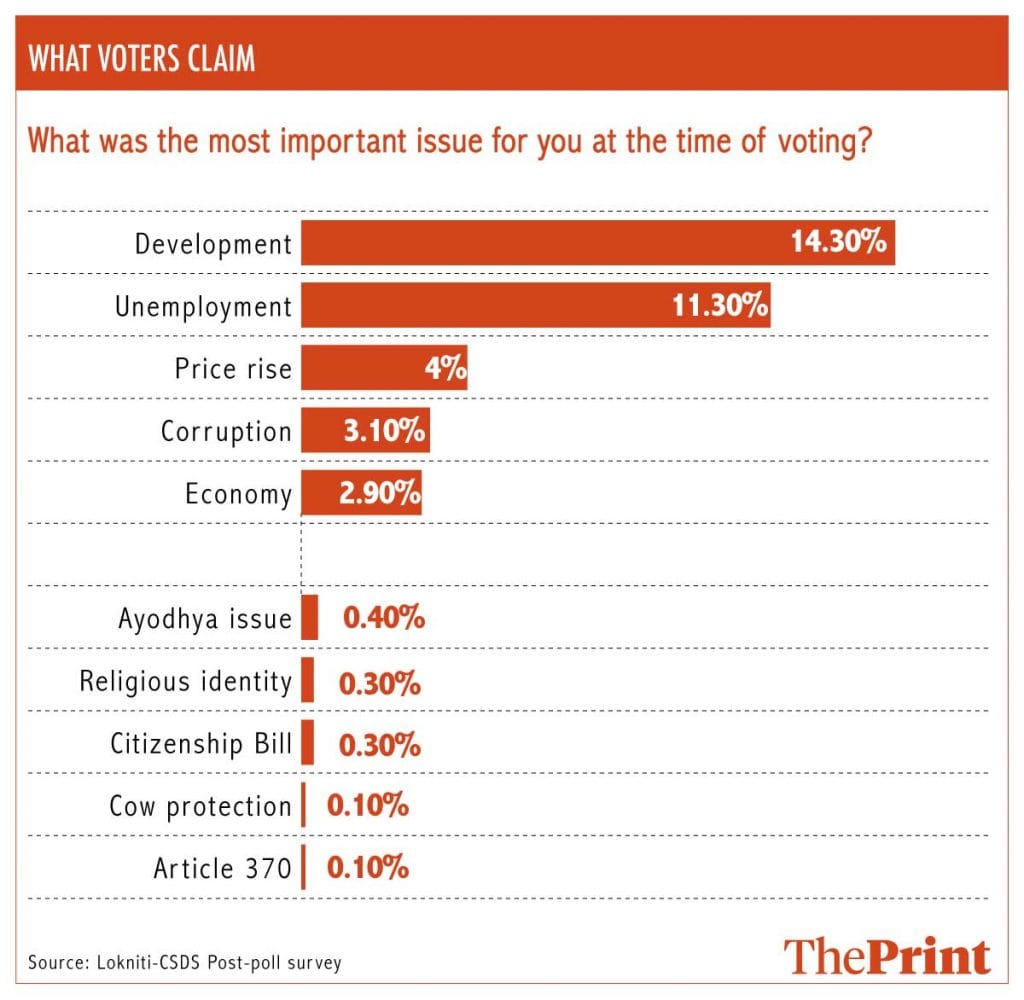
But forming an opinion based on these responses alone is naive at best. What’s more likely is that while voters do care about the material improvements, they’re voting for parties based far more on ideological lines. After all, most political parties in India do promise development; the Congress-led UPA did a better job on employment than Narendra Modi-led BJP in its first term. Despite the common refrain that “they’re all the same”, the key political antagonists in India are not the same on ideological lines, particularly religion.
In their book ‘Ideology and Identity: The Changing Party Systems of India’ published in 2018, political scientists Pradeep Chhibber and Rahul Verma demonstrated that Indian political parties and voters are strongly and consistently ideological. As part of the book’s quantitative work, they constructed an index of “the politics of recognition”, which looked at voter responses to questions relating to key issues of identity in successive rounds of post-election National Election Studies conducted by the Lokniti programme of the Centre for the Study of Developing Societies (CSDS).
Also read: Why and how ideology is central to winning elections in India
The surveys asked voters for their views on the banning of cow slaughter, religious conversion and other key “core Hindutva” issues, among other questions. Chhibber and Verma then coded these responses to determine whether Congress and BJP voters were ideologically dissimilar.
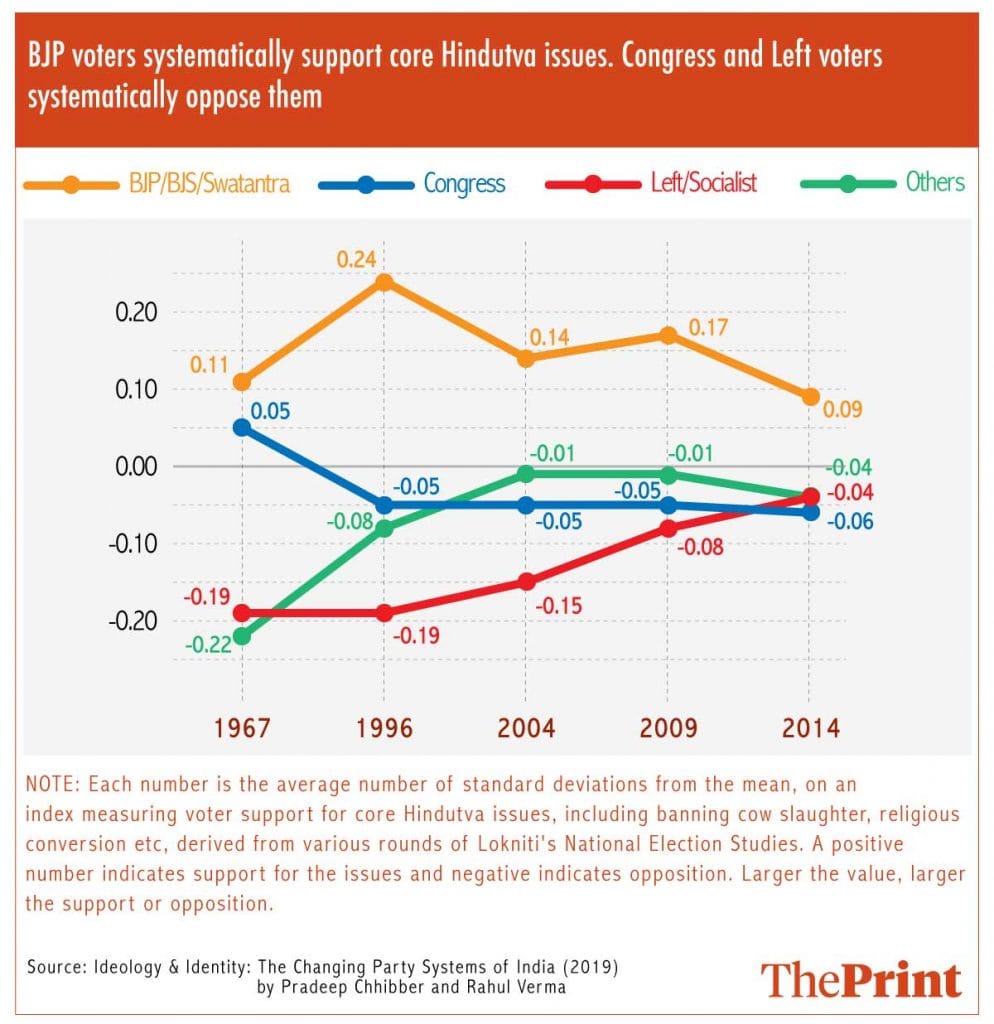
The survey results are stark: BJP voters systematically supported such core Hindutva issues, while Congress voters systematically opposed them (although their opposition was far weaker than that of Left supporters).
This trend has not changed with time; to argue then that voters in India do not care about religious hot-button issues would be disingenuous, given that their positions on these issues are strong and consistent over time, and firmly aligned with one party or the other.
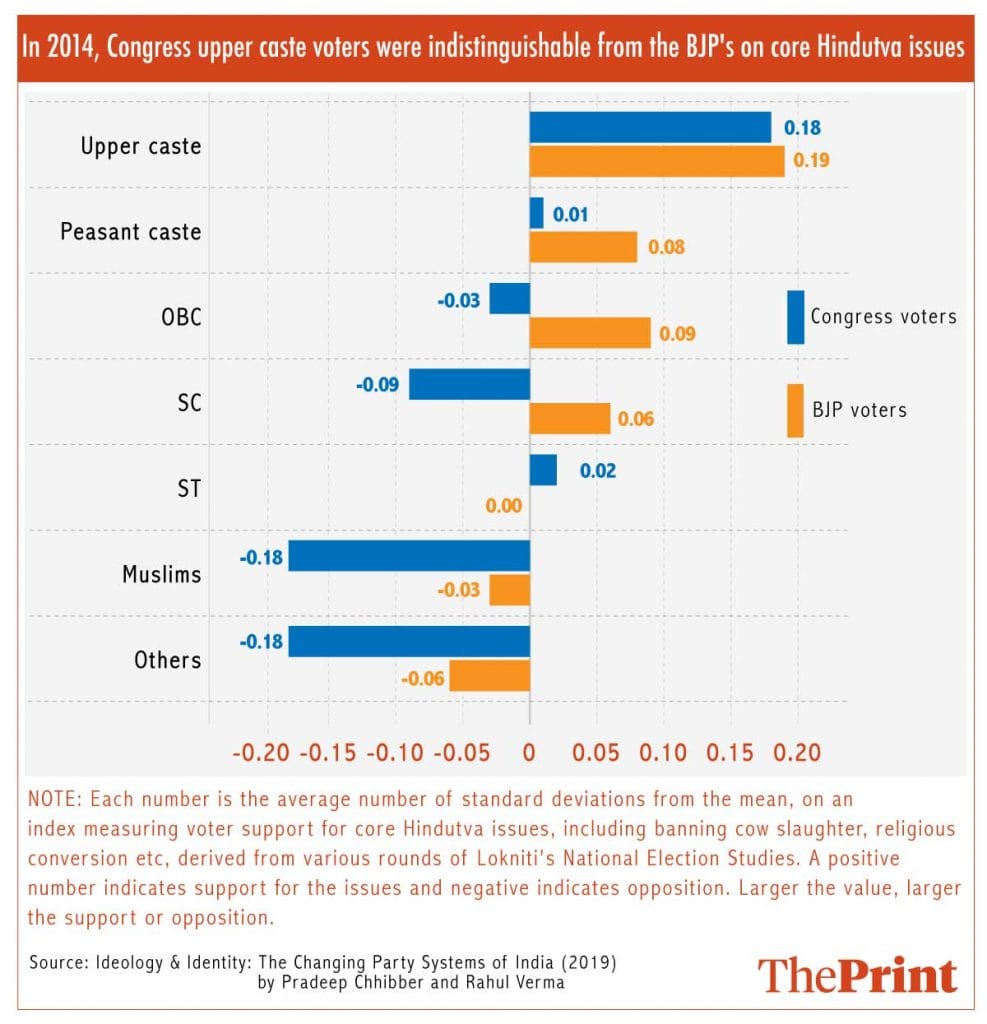
Among BJP voters, all groups support these issues (which, in 2014 – the most recent year for which detailed CSDS data is available – included, for instance, that the government should not make special provisions to accommodate minorities), except their negligible Muslim support base.
Also read: Ram mandir’s done, now Modi can’t ride more Hindu nationalism as economy is stalling
Among Congress voters, on the other hand, all groups opposed these core Hindutva issues, except their small upper-caste voter base — Congress and BJP upper-caste voters were virtually indistinguishable on this count.
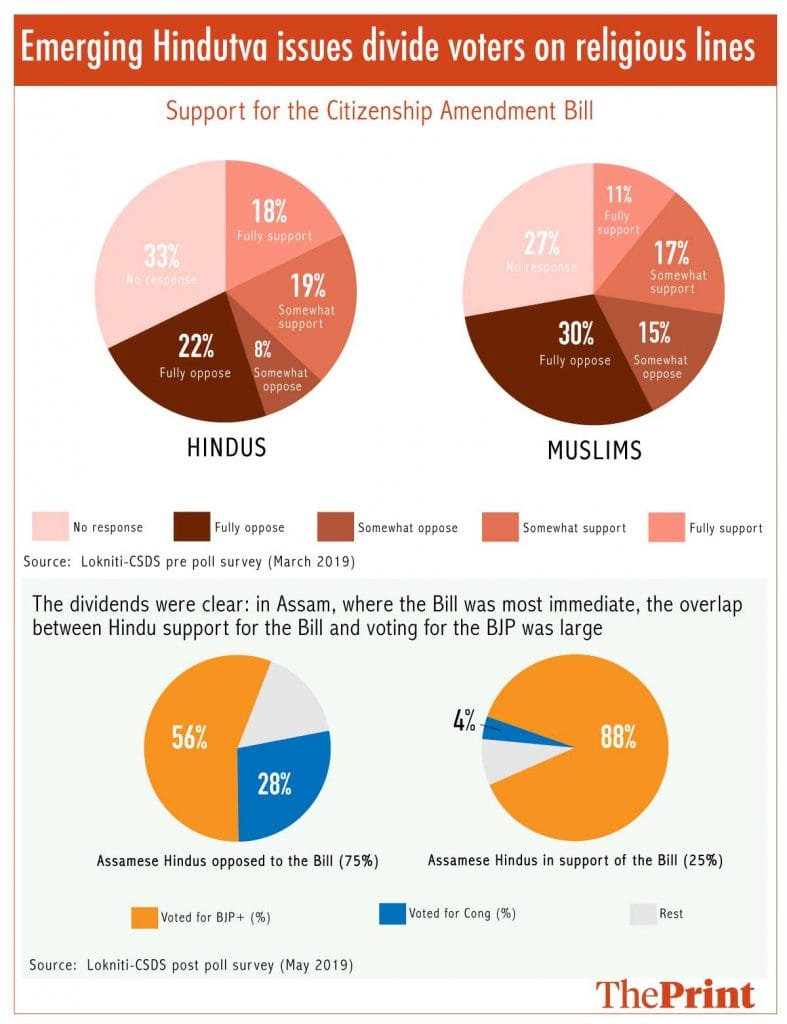
Since the first term of the Modi government, while older “core Hindutva” issues, including the banning of cow slaughter and religious conversion, forcefully integrating Kashmir with the mainland through the scrapping of Article 370, and building a Ram Mandir in Ayodhya have been revived, the BJP has also come up with newer core Hindutva 2.0 issues. Top among these is the Citizenship Amendment Bill (passed by the 16th Lok Sabha, but not taken up by the Rajya Sabha, and sent to a joint committee of Parliament) that seeks to grant citizenship to non-Muslim illegal immigrants.
Hindus were more likely to support than oppose the bill, while Muslims were more likely to oppose it. The intersection between religious partisanship and political partisanship on these issues is clear. In Assam, for instance, where illegal immigration and its intersection with religion is a particularly charged issue, Hindus who supported this bill overwhelmingly voted for the BJP.
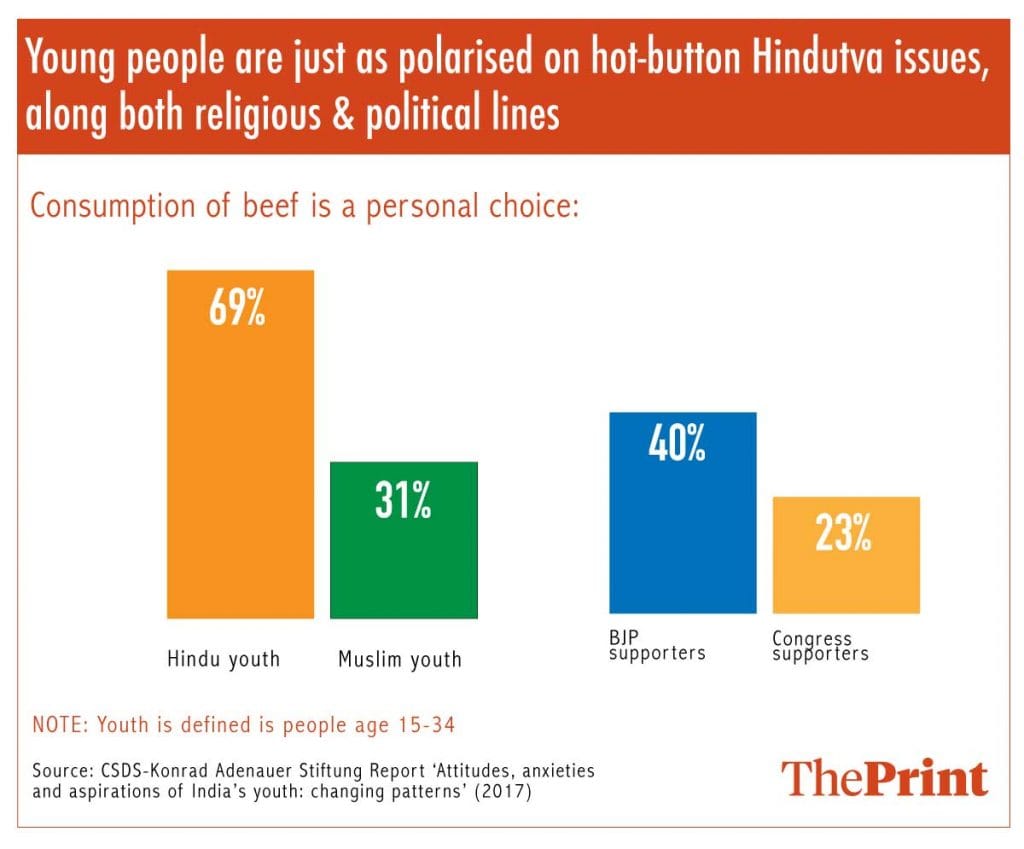
Just as it is disingenuous to say that voters do not care about core Hindutva issues, another common refrain of the commentariat is equally hollow — that young people in India do not care about these issues.
Surveying only millennials (aged 15-34) in 2017, a survey found that Hindu youth strongly opposed the consumption of beef, for instance, as did BJP-supporting young people.
Also read: Can Ayodhya Ram Mandir work for BJP in states when PM Modi didn’t?
The voters of the future may say that they are electing leaders for jobs alone, but the revealed preferences of Indian voters have always been apparent.
The author is a Chennai-based data journalist. Views are personal.



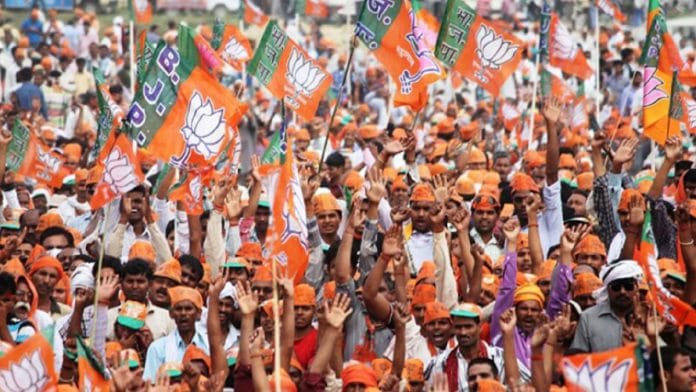



Sicere and bonafied citizen ahve been vexed enough with rotten issues, rama and rahim,they shall remain united unless and until provocative quarrelsome would not ceased by a majority section of Media, They not only feel but act like complainant,respondent and judge of all issues under the earth and this attitudinal behavior have damaged the nature and natural elelments of our land. We must make a road map on how to eradicate poverty,illiteracy,scarcity of drops of potable water by diging at-least four ponds in each panchayets for next genration. we should think on how to jump from minus mode to positive one, there is not a single investors, illegalities have formed a legitimate shape of cottage industries,traders and corrupt officials are scot free, then what is the need of such hue and cry where half of the Muslim populations are idirectly engaged and involved in the worsip and servise of RAM LALLA or RAMMALLAH!!!!!
MODI MUST IMMEDIATELY GET PRIESTS FROM AMONGST DALITS -BOTH MEN AND WOMEN APPOINTED IN ALL MAJOR TEMPLES AND IF NECESSARY AMEND LAWS THE WAY ALREADY HOLLOWED OUT ARTICLE 370 WAS AMENDED BY BY PASSING ALL DEMOCRATIC NORMS
ok….after that remove reservation also ….there will be no reservation in temple and there is no reservation in govt also
Yes and that is why the country is in sh** hole.
Fight is between Mandal and kamandal .Your mentioned parties are essentially kamandal parties with certain differences . But as of today kamandals have abandoned Congress. Caste privileges should remain but reservations should go. But one thing is throughout history and everywhere religious issues were utilised to incite people for political benefits.
Surely, Anon, you don’t support caste privileges?
It’s very worrying that even young Hindus have been infected with an ideology that promotes difference and the othering of the minority communities. That’s how it started with Hitler, remember?